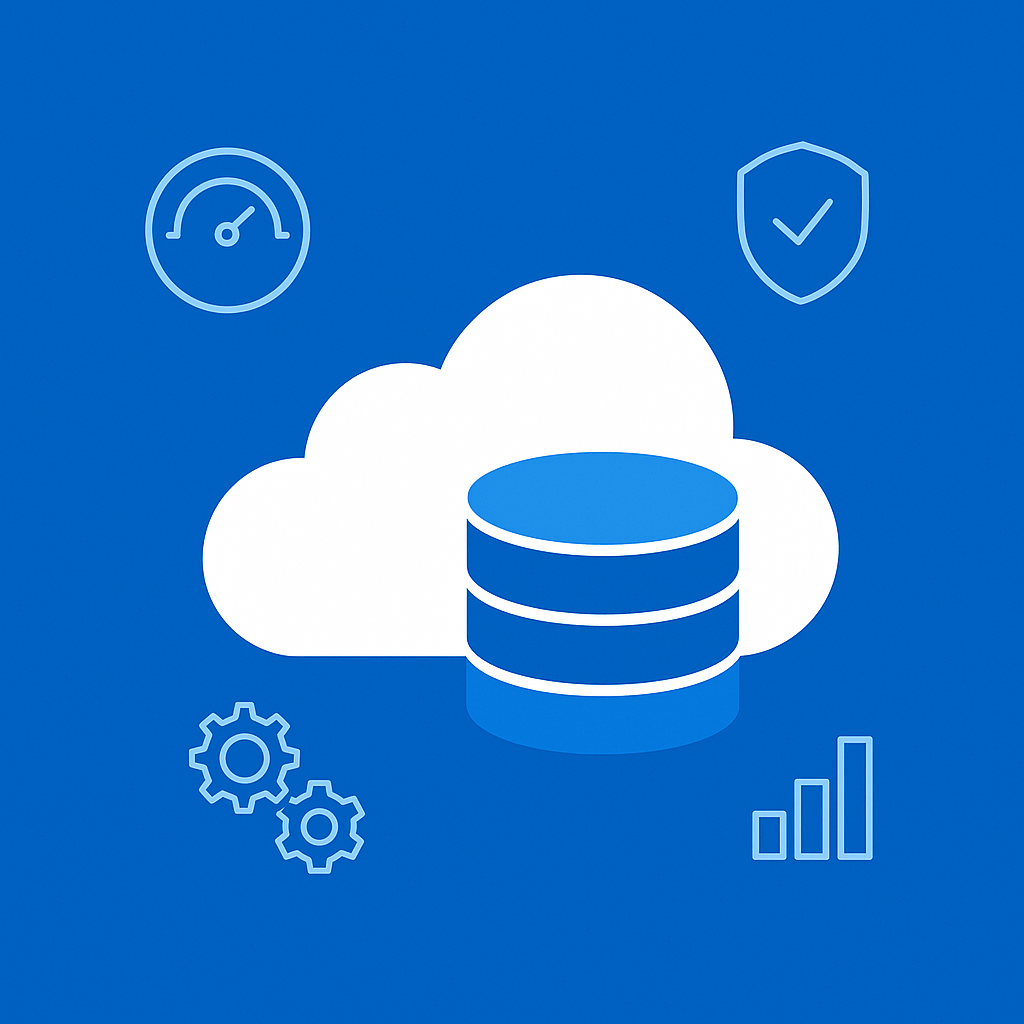In the ever-evolving digital economy, Modern DBaaS: Fast, Secure & Scalable Database Solutions, data is the foundation of innovation, customer experiences, and operational efficiency. Managing, storing, and accessing this data quickly and securely is no longer optional — it’s mission-critical. However, traditional database management requires substantial resources, technical expertise, and time, often diverting focus from core business goals.
Enter Database as a Service (DBaaS) — a modern solution built for businesses that demand speed, security, scalability, and simplicity.
This article explores what DBaaS is, its benefits, key use cases across industries, how to choose the right solution, and why it’s becoming the backbone of modern digital businesses.

What is Database as a Service (DBaaS)?
Database as a Service (DBaaS) is a cloud computing service that provides organizations with access to a database without the need to set up physical hardware, install database software, or perform ongoing maintenance.
In a DBaaS model:
- The cloud provider manages the database infrastructure.
- Organizations access databases through simple APIs or web-based interfaces.
- Scaling, patching, backups, updates, and security are handled automatically.
Essentially, DBaaS offers a “plug-and-play” database experience, allowing businesses to quickly deploy and use databases without the complexities of traditional setups.
Why DBaaS Matters Today
The demand for DBaaS is skyrocketing for good reasons:
- Data explosion: Businesses generate terabytes of data daily — manual management is unsustainable.
- Speed to market: Companies need to launch apps and services rapidly to stay competitive.
- Focus on core business: Organizations want their engineers focused on product innovation, not infrastructure maintenance.
- Security concerns: Managing data security internally is complex and risky; outsourcing it to specialized providers ensures stronger protections.
According to Gartner, more than 75% of all databases will be deployed or migrated to a cloud platform by 2025, indicating the shift toward DBaaS as a standard.
Key Features of Modern DBaaS Solutions
1. Fully Managed Service
DBaaS providers handle:
- Hardware provisioning
- Software installation and updates
- Backup management
- Disaster recovery
- Monitoring and performance tuning
Businesses can shift their attention from “How do we manage this?” to “How can we use this to grow?”
2. High Availability and Uptime
Modern DBaaS ensures:
- Automatic failover mechanisms
- Redundancy across multiple data centers
- 99.99% uptime SLAs (Service Level Agreements)
This means businesses experience minimal downtime — critical for applications like banking, healthcare, and e-commerce.
3. Scalability on Demand
Gone are the days of provisioning large servers “just in case.” DBaaS platforms:
- Scale vertically (more CPU, RAM) and horizontally (more nodes) automatically.
- Handle traffic spikes without manual intervention.
- Allow “elastic” billing models where you pay only for what you use.
4. Enterprise-Grade Security
Security is non-negotiable. DBaaS providers offer:
- Encryption at rest and in transit
- Network isolation through Virtual Private Clouds (VPCs)
- Role-based access controls (RBAC)
- Threat detection and automated patching
Many platforms comply with industry standards such as HIPAA, GDPR, PCI DSS, and SOC 2 Type II.
5. Support for Multiple Database Types
Modern DBaaS platforms support a wide range of database engines:
- Relational Databases: MySQL, PostgreSQL, Microsoft SQL Server, Oracle DB
- NoSQL Databases: MongoDB, Cassandra, DynamoDB
- NewSQL and Cloud-Native Databases: Google Spanner, CockroachDB, Amazon Aurora
This flexibility allows businesses to choose the best database type for each workload.
Top Business Benefits of Using Modern DBaaS
🚀 Speed and Agility
Deploy a fully functional database in minutes rather than weeks.
Speed to market is crucial, especially for startups and SaaS companies that need to outpace competitors.
🔒 Enhanced Security
DBaaS providers invest heavily in cybersecurity, offering protections many businesses couldn’t achieve on their own.
- Regular security audits
- Advanced firewall protections
- Data masking and tokenization options
- Real-time threat intelligence integration
💸 Cost Optimization
With DBaaS:
- No upfront costs for hardware and software
- Lower administrative overhead
- Predictable monthly pricing models
- Reduced need for in-house DBA teams
This cost-effective model enables better cash flow management, especially for growing businesses.
🌎 Global Accessibility
Need a database that’s accessible across continents?
DBaaS providers operate data centers worldwide, allowing low-latency access and compliance with local data residency laws.
🛡️ Disaster Recovery Built-In
Out-of-the-box:
- Automated backups
- Point-in-time restores
- Geo-redundancy
- Rapid recovery time objectives (RTOs)
Companies can meet even the most stringent business continuity and disaster recovery requirements.
Real-World Use Cases for Modern DBaaS
1. E-commerce Platforms
An e-commerce company using DBaaS can handle traffic surges during Black Friday without system crashes or performance lags — thanks to auto-scaling and high availability.
2. Healthcare Applications
A healthcare provider can store patient records securely in HIPAA-compliant DBaaS systems, enabling instant access to critical health data while maintaining strict regulatory compliance.
3. Financial Services
Fintech companies can build payment gateways and fraud detection systems on DBaaS platforms, ensuring rapid transactions and real-time risk analysis with zero downtime.
4. SaaS Product Development
Startups building SaaS products benefit from the agility, scalability, and reduced time-to-market offered by DBaaS — launching apps faster without worrying about database administration.
5. IoT and Big Data Solutions
IoT platforms generate massive amounts of real-time data. DBaaS platforms designed for high-throughput ingestion allow seamless storage, processing, and querying of this data at scale.
Challenges and Considerations When Using DBaaS
While DBaaS offers numerous advantages, businesses should be mindful of:
- Vendor lock-in: Migrating away from a cloud provider can be complex and costly.
- Data sovereignty: Ensure your provider complies with local data storage regulations.
- Performance tuning: Although managed, some high-performance workloads may still require custom tuning.
- Cost control: Mismanaged auto-scaling or unmonitored usage can lead to unexpected bills.
Choosing the right partner and maintaining proactive monitoring can mitigate these risks.
How to Choose the Right Modern DBaaS Provider
When evaluating DBaaS providers, consider:
| Criteria | Questions to Ask |
|---|---|
| Performance | What are the latency and throughput benchmarks? |
| Security & Compliance | Does it meet my industry’s compliance standards? |
| Scalability | How easily can I scale up or down? |
| Supported Databases | Are my preferred engines supported? |
| Pricing Transparency | Are there hidden fees for backups, reads, writes? |
| Global Presence | Are data centers available in my target regions? |
| Support | Is 24/7 technical support included? |
| Disaster Recovery | What are the RTOs and RPOs guaranteed? |
Top DBaaS providers to consider include Amazon RDS, Azure SQL Database, Google Cloud SQL, MongoDB Atlas, and IBM Cloud Databases.
Future Trends in Modern DBaaS
The DBaaS landscape is constantly evolving. Key emerging trends include:
- Serverless Databases: No need to provision instances; databases auto-scale based on demand.
- AI-Optimized Databases: Intelligent tuning and predictive maintenance through machine learning.
- Multi-cloud DBaaS: Providers offering services across AWS, Azure, GCP for flexibility.
- Edge Computing Integration: Databases distributed closer to end users for ultra-low latency.
- Increased Emphasis on Sustainability: Energy-efficient cloud database solutions.
Businesses that leverage these innovations will gain a significant competitive advantage.
Conclusion:
Why Modern DBaaS is the Future of Data Management
As businesses continue to embrace digital transformation, the need for fast, secure, and scalable data management solutions has never been greater.
Modern Database as a Service (DBaaS) platforms provide the performance, security, agility, and cost-efficiency required to succeed in today’s dynamic market.
Whether you’re a startup innovating rapidly or an enterprise seeking operational excellence, DBaaS empowers your business to focus on growth — not infrastructure.
By choosing the right DBaaS solution, companies can unlock new possibilities, improve customer experiences, and future-proof their operations in a data-driven world.
Ready to modernize your data strategy? Explore how RaeonTech’s DBaaS solutions can transform your business today.


